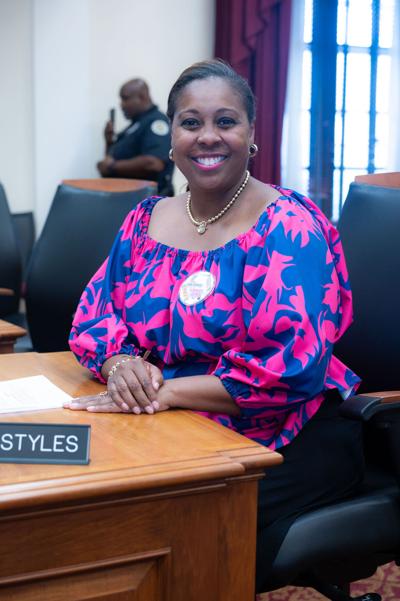
Councilmember Joy Styles
Street View is a monthly column taking a close look at development-related issues affecting different neighborhoods throughout the city.
At a Metro Council Planning and Zoning Committee meeting in early May, Councilmember Joy Styles took to the floor to pull a seemingly uncontroversial bill from circulation. RS2025-1206, designed to divert a sewer main in Styles’ District 32, would create extra infrastructure capacity for an affordable housing project at 2920 Hamilton Church Road in Antioch.
But behind the bill was a project Styles said she and her constituents didn’t want. “This is a project that is coming to my district [with] absolutely no conversation,” Styles said at the May 5 Planning and Zoning meeting. She told the committee that the project’s developers claimed they’d contacted her in November, but she had no record of that contact.
They “moved forward with a project that I know my constituents are going to be livid about,” Styles said. ”My district is not in need nor wants” any apartments, she continued.
The proposed housing is 68 units from Autumn Lake Apartments: a mix of one-, two- and three-bedroom units set at an affordable cap for residents making 60 percent of Nashville’s area median income or less. The complex is funded through the Low-Income Housing Tax Credit program, which gives tax credits to housing developers who reserve a certain number of units for lower- and middle-income residents.
In an interview with the Scene, Styles says she’s since had discussions with the developer to make the complex a better fit for her district.
Automated scanners approved for countywide implementation despite protests from community and councilmembers
“This property is going to have license plate readers,” says Styles, referencing a controversial surveillance technology that the city has experimented with in the past. “It’s going to have a gate, and I am working with the developer on the rules for the community — it’s going to be a three-strikes-you’re-out community.” She adds that the three-strikes rule applies to family and friends who visit tenants as well.
Styles says apartment complexes in her district have had crime problems in the past. “People take advantage of the fact that apartment complexes are very large,” she says. “So if you do something criminal … it’s harder to find you.”
It’s worth noting that overall, recent studies have shown that adding low-income housing actually reduces crime in neighborhoods, despite persistent cultural myths stating the contrary.
Beyond the lack of communication and crime concerns, Styles says the addition of another apartment complex in Antioch is evidence of a broader issue. The city is trying to concentrate more affordable housing in Antioch because the zoning there is friendly to density, but Styles says this housing would be better suited elsewhere.
“No one wants apartments in Antioch, period,” she says. “We are inundated.”
Neighborhood opposition to new housing often comes in the form of conversations about traffic capacity, stormwater and infrastructure concerns, or conversations about “preserving neighborhood character.” Neighborhood groups can also use zoning as a tool to preserve existing housing patterns, including density. These policies can make Nashville unlivable for many people.
The city has an affordable housing crisis, but developments that attempt to ease the strain frequently face opposition from neighborhood advocates
But Styles speaks to the issue in a more straightforward fashion when it comes to her constituents. “I understand the need for affordable housing,” she says. “But affordable housing is needed in other places.”
According to the Metro Planning Department’s Unified Housing Strategy, the city needs to build another 90,000 units in the next 10 years to meet forecasted demand. And that housing should be affordable to meet people’s needs: Nearly half of Davidson County renters are considered “cost burdened,” meaning they spend more than 30 percent of their income on rent.
But in practice, where this housing will go is very much up for debate. Styles tells the Scene she’d like to see more homes her constituents can “grow into” — an array of housing ranging from affordable apartments to more expensive homes. “If I had a segment of my population that had million-dollar homes, then it makes sense to try and come up with an affordable housing alternative, right?” She says this is not the case in her district, where people often move away when more expensive homes are within reach.
After meeting with Autumn Lake representatives, Styles passed the bill allowing the sewer diversion for the new complex. She’s now in discussions with community members about the project and recently unveiled plans for a revamped development at the former Starwood Amphitheatre site, also in District 32.
But in the meantime, her comments about neighborhood housing are part of a wider debate across the city. Affordable units need to be built somewhere to keep Nashville livable. But are they better placed in an area with higher-priced homes or in an area with existing affordable apartments?
Put more simply, Styles says Antioch doesn’t want to sign up for any more apartments. But who will?







